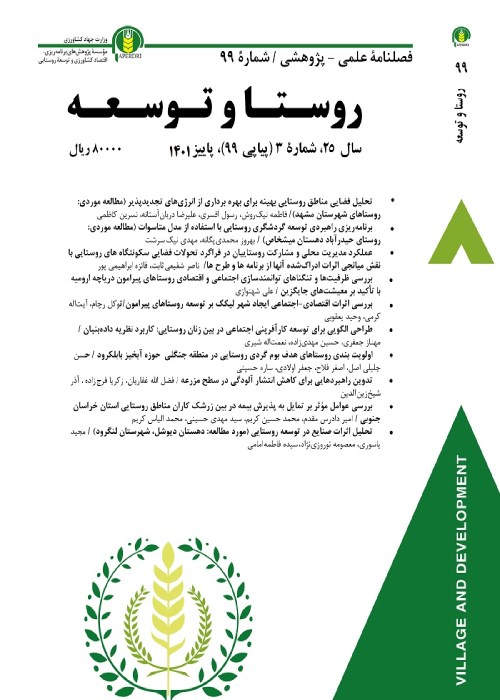On-Farm Research: Features and Functions
Author(s):
Abstract:
On-farm Research (OFR) is complementary to on-station research and is a connecting bridge between farmers, research and extension. The variables that can influence OFR include: type of farmers (small, large, man, woman), farmer’s land, nature and degree of farmer’s involvement in research and farmer’s environment. The purpose of this kind of research is experimentation and confirmation of on-station results, generating and adapting modern technologies, and demonstration and diffusion of generated technology. OFR is more of experimental and occasionally of developmental type. The experiments are managed by researchers, farmers or jointly by researchers and farmers. Farmers involvement in research experiments varies from instrumental and passive to very active. Developmental OFR utilizes extension techniques and methods to introduce concepts or building farmers’ awareness; it needs, thus, involvement of researchers, farmers and extension agents. Developmental OFR has three stages: exploratory, intermediate and pilot. Technologies under experimentation in this OFR can include one of these three forms: a) single component, such as chemical fertilizer or one variety of a crop; b) package, including independent components such as improved seeds, chemical fertilizers, and herbicides; and c) composite, including several interactive components such as alley farming. Transforming OFR from a single component to composite necessitates gradual reduction and omission of the gap between agricultural research and extension. Recommendation for the dissemination of new technology should be carried out through leaders of village community, organizing public meetings and explaining the benefits of technology. Utilization of posters, demonstration of methods, results, and successful examples can strongly affect the adoption of technology by farmers. Attracting farmer’s participation and generating a sense of confidence in them, training, practicality of research, and linking research and extension can be counted as most important advantages of OFR. The most important disadvantage is the lack of complete control over research subject by researcher.
Keywords:
Language:
Persian
Published:
Journal of Village and Development, Volume:9 Issue: 4, 2007
Page:
55
magiran.com/p462231
دانلود و مطالعه متن این مقاله با یکی از روشهای زیر امکان پذیر است:
اشتراک شخصی
با عضویت و پرداخت آنلاین حق اشتراک یکساله به مبلغ 1,390,000ريال میتوانید 70 عنوان مطلب دانلود کنید!
اشتراک سازمانی
به کتابخانه دانشگاه یا محل کار خود پیشنهاد کنید تا اشتراک سازمانی این پایگاه را برای دسترسی نامحدود همه کاربران به متن مطالب تهیه نمایند!
توجه!
- حق عضویت دریافتی صرف حمایت از نشریات عضو و نگهداری، تکمیل و توسعه مگیران میشود.
- پرداخت حق اشتراک و دانلود مقالات اجازه بازنشر آن در سایر رسانههای چاپی و دیجیتال را به کاربر نمیدهد.
دسترسی سراسری کاربران دانشگاه پیام نور!
اعضای هیئت علمی و دانشجویان دانشگاه پیام نور در سراسر کشور، در صورت ثبت نام با ایمیل دانشگاهی، تا پایان فروردین ماه 1403 به مقالات سایت دسترسی خواهند داشت!
In order to view content subscription is required
Personal subscription
Subscribe magiran.com for 70 € euros via PayPal and download 70 articles during a year.
Organization subscription
Please contact us to subscribe your university or library for unlimited access!


